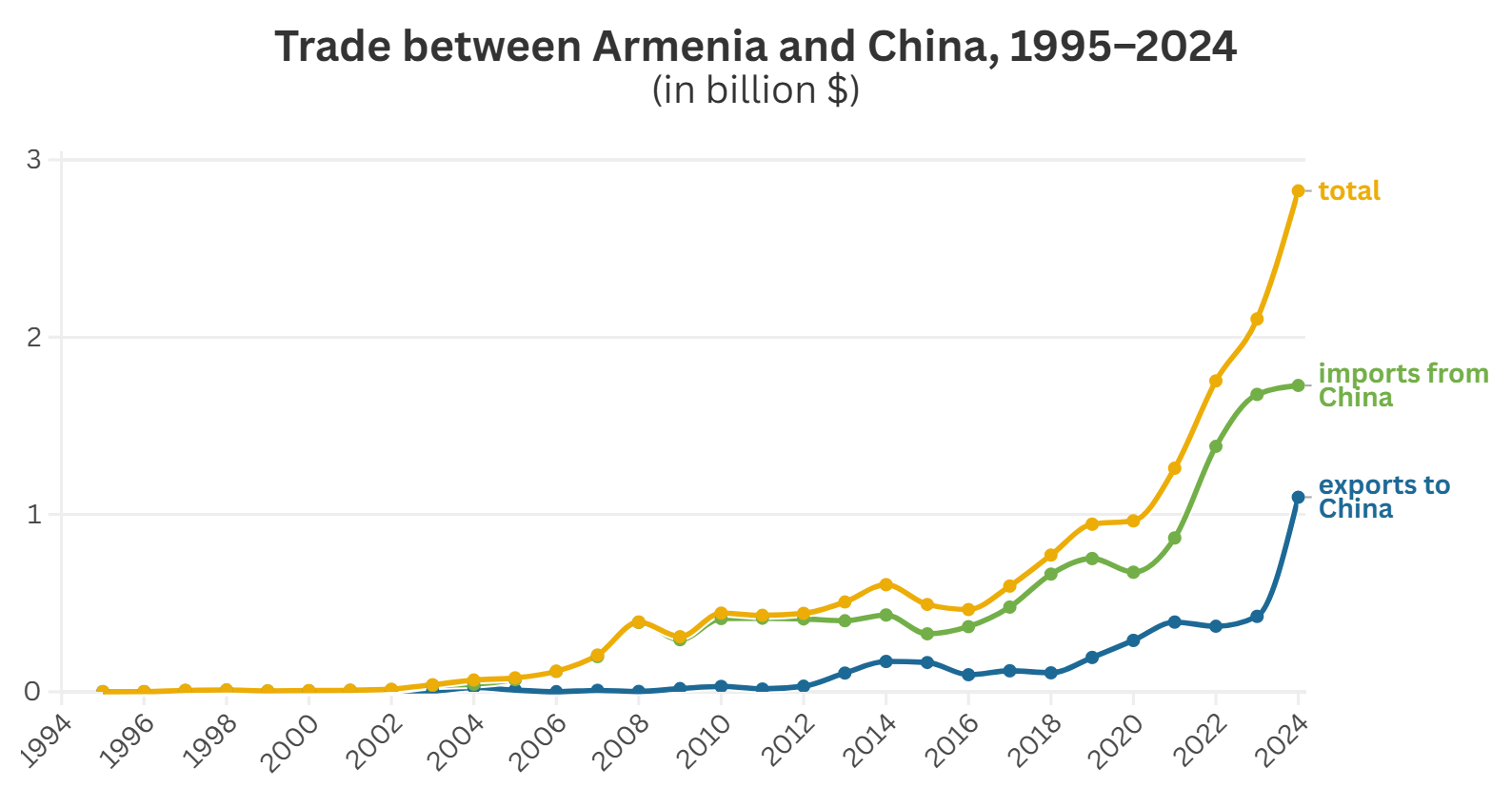
Listen to the article.
In August 2017, when construction broke ground for a large Chinese embassy complex in Yerevan, China’s Assistant Foreign Minister Li Huilai spoke of “unprecedentedly high-level relations and friendship” between the two countries. The size of the new embassy, the second-largest Chinese mission in the former Soviet Union, did suggest a positive trajectory at the time.
While Armenia’s neighbors Georgia and Azerbaijan have signed strategic partnership agreements with Beijing in the past two years, Armenia has moved in a different direction by signing a strategic partnership with Washington this January. In a recent press conference, Prime Minister Pashinyan stated that Armenia maintains “a very dynamic and, in some ways, effective phase of cooperation with China.” He added there is “very active interaction and dialogue” with Beijing. The relationship appears primarily focused on economic cooperation, while political and security dimensions have developed at a different pace.
Warm, But Dormant?
When Pashinyan visited China in 2019, he told President Xi Jinping that ties with China were a priority for Yerevan. “It is extremely important for us to maintain constructive and productive relationships with China,” he added. Marking 30 years of diplomatic ties three years later, Xi described the two countries as “traditional friendly partners” who have maintained “sound and stable momentum for development.” In a social media post this January, Pashinyan insisted that Armenia has reached a milestone in its balanced foreign policy, noting that relations with China are “developing and deepening.”
According to the most recent IRI poll, conducted in September 2024, 77% of respondents in Armenia rated ties with China positively, a level comparable to public perceptions of Armenia’s relations with the EU. However, ties appear to have cooled or stagnated in recent years.
Some Armenian analysts suggested that bilateral relations may have been negatively impacted following Yerevan’s decision to join the U.S.-led International Religious Freedom Alliance, initiated by Trump’s Secretary of State Mike Pompeo. Armenia’s Foreign Ministry announced its participation in June 2020, a move welcomed by Washington but criticized by those warning of potential strains with Beijing, as the alliance specifically targeted religious freedom concerns in China. At the time, Armenia’s then-Foreign Minister Zohrab Mnatsakanyan insisted that Armenia did not pursue cooperation with one partner “at the expense of another partner.”
More recently, another point of contention emerged: China has not appointed a new ambassador to Yerevan since the previous envoy left in July 2024. Government critics argue that the delay signals Beijing’s dissatisfaction with Armenia’s foreign policy shifts. In a January press conference, Pashinyan downplayed concerns, describing the situation as “just a matter of timing.” Meanwhile, China’s chargé d’affaires stated in early February that a new ambassador would be appointed “soon.”
In January 2024, Armenia appointed Vahe Gevorgyan, who had served as Deputy Foreign Minister since 2021, as its ambassador to Beijing. Nerses Kopalyan, a security contributor to EVN Report, called the appointment “very prudent,” noting that Gevorgyan has “acute knowledge of the structural factors shaping Sino-Armenian relations.”
Yerevan has also tread carefully on the international stage. In October 2022, while holding a temporary seat on the UN Human Rights Council, Armenia abstained from a vote on whether to hold a debate on human rights in China’s Xinjiang Uyghur Autonomous Region. Western countries voted in favor, while most Global South nations voted against. Armenia, alongside Argentina, Brazil, India, Mexico, and Ukraine, chose to abstain.
Belt and Road Initiative and Investments
Armenia and China signed a memorandum on the Belt and Road Initiative (BRI)— then called the “Silk Road Economic Belt”—during President Serzh Sargsyan’s visit to Beijing in March 2015. However, Armenia has since failed to secure major infrastructure projects under the initiative. In contrast, the largest Chinese investment in the region was announced by Georgia last year, when Tbilisi selected a Chinese consortium to build a deep-sea port in Anaklia on the Black Sea.
A recent report by Luys, a think tank linked to former officials, argues that the Pashinyan government has not been proactive in engaging with China. The report asserts that China remains interested in Armenia, but Yerevan underestimates the initiative’s importance and lacks a clear policy toward the BRI. Nevertheless, Chinese firms have participated in Armenian infrastructure projects, notably contributing to a section of the North-South highway and the Kaps reservoir.
Defense
In 1999, Armenia’s late Defense Minister and Prime Minister Vazgen Sargsyan secured what became the first procurement of non-Russian armament from China when it acquired four WM-80 multiple rocket launchers. Defense ties grew during Serzh Sargsyan’s presidency with China pledging in 2013 to provide 5 million yuan ($826,000) annually as military aid. In 2017, Defense Minister Vigen Sargsyan’s high-profile visit to Beijing included tours at Poly Group and Norinco, China’s largest weapons manufacturers. He signed an agreement for a 10 million yuan ($1.5 million) aid package for Armenia’s defense industry, which Sargsyan said would be used for non-lethal equipment, such as surveillance and communications equipment. He also did not rule out arms and ammunition procurement at the time.
Recent engagements have been sporadic. In late 2022, Edvard Asryan, Chief of the General Staff, met with China’s ambassador and military attaché to Armenia to discuss cooperation in peacekeeping, education, and medicine. Defense Minister Suren Papikyan has attended the high-level Beijing Xiangshan Forum on security and defense in 2023 and 2024. When he met with his Chinese counterpart Dong Jun, they “underscored the elevated level of relations” and “noted the substantial progress in military cooperation in recent years, including the exploration of new areas.”
Trade Continues to Expand
Bilateral trade between Armenia and China stood below $10 million in 2001 when China joined the World Trade Organization (WTO), which grew rapidly to nearly $400 million by 2008. Last year it reached $2.8 billion.
Between 2009 and 2022, China was consistently Armenia’s second-largest trade partner after Russia. In the past two years, it has lost its position to the United Arab Emirates (UAE).

Just four groups of goods made up more than 70% of the $1.7 billion Chinese imports to Armenia in 2023, according to data from Armenia’s State Revenue Committee. These include mechanical appliances and machinery (25%), electrical machinery and equipment (22%), vehicles (16%), textiles, clothing, footwear and headgear (11%).
Computers and laptops represent nearly a quarter of the imports in the mechanical appliances and machinery category at $104 million and are followed by washing machines ($30 million), air conditioning ($28 million), bulldozers ($27 million), cranes ($17 million), refrigerators and freezers ($15 million), and a myriad of other household appliances and commercial equipment.
In the electronics category, smartphones and other communication devices represent more than 40% of the total, valued at $145 million. These are followed by semiconductor devices at $43 million and monitors, projectors and televisions at $32 million.
Half of the vehicles imported from China are passenger cars ($127 million). The rest are buses ($45 million), followed by special-purpose vehicles ($28 million), and trucks and vans ($24 million).
Armenian exports to China in 2023 stood at $425 million with more than 96% being copper (81%) and molybdenum ores and concentrates. Full data for 2024 is only available for the first six months. Armenian exports stood at $712 million in the first two quarters with gold at 63% or $446 million, followed by copper ores at $195 million (27%), silver at $48 million (7%) and molybdenum ores at $11 million (1.5%). Overall, 78% of Armenia’s copper exports went to China.
Tourism
In May 2019, the two countries mutually eliminated visa requirements for ordinary passports. It entered into force in January 2020 making Armenia one of the few countries in wider Europe with no visa requirements with China—along with Albania, Belarus, Bosnia and Serbia.
Last year, the first direct flights between the two countries were launched. From September 2024, there have been biweekly flights between Yerevan and the western Chinese city of Urumqi operated by China Southern Airlines.
2024 saw nearly 33,000 Chinese nationals visiting Armenia for tourism, a 65% increase from 2023, when almost 20,000 Chinese visited. This is more than French (30,200) or German (28,700) nationals.
Soft Power
Chinese soft power influence is exercised through various means. China’s state-run China Global Television Network (CGTN) maintains an Armenian social media presence.
Education is perhaps the most visible aspect. A Confucius Institute was established at Armenia’s Brusov State University in 2009 with Chinese state support. The university says it is “engaged in promoting Chinese culture and teaching Chinese language.” Within the first three years, it helped 50 Armenian students continue their education in China. A Confucius Class was set up at the Russian-Armenian University in 2021. Yerevan State University, Armenia’s main public university, established a Center for Chinese Language and Chinese Culture in 2015.
The Chinese-Armenian Friendship School, which teaches grades 5 to 12, was established in Yerevan’s Kanaker district in 2018 with $12 million funding from Beijing. It is a public school that offers three hours of intensive Chinese language instruction per week. Originally designed for 405 students, it now has 700.
China has further provided significant assistance in the form of vehicles. In 2012, China donated 249 Higer buses, worth around 11.7 million, which were integrated into Yerevan’s public transport system to replace minibuses. In 2018, China donated 200 ambulances to Armenia.
During the Covid pandemic, China donated 100,000 doses of the CoronaVac (Sinovac) vaccine.
Also see
Armenia Looks to the Arab World
To diversify its economic and political ties, Armenia has strengthened relations with the Arab world, including establishing diplomatic ties with Saudi Arabia in 2023 and recognizing Palestine in 2024. Hovhannes Nazaretyan provides a comprehensive overview of these growing connections.
Read moreRegional (Dis)Connectivity: Armenia’s Trade With Neighbors
Armenia trades with three of its four neighboring countries, except Azerbaijan. Land borders with Georgia and Iran serve as crucial lifelines for Armenia, connecting the landlocked country to the global market.
Read morePolitics
Investment Arbitration and Armenia: Policies, Risks and Opportunities
Investment arbitration plays a pivotal role in a country’s economic landscape, balancing investor protections with national sovereignty. Davit Khachatryan examines key cases, risks and policy implications, shedding light on how arbitration shapes Armenia’s investment climate and its broader geopolitical and economic strategies.
Read moreAliyev’s Campaign: Aiming to Deter International Support for Armenia
Azerbaijani President Ilham Aliyev’s escalating rhetoric against Armenia aims to justify Baku's coercive tactics, block peace efforts and intimidate international actors. Sossi Tatikyan examines Aliyev's narratives about Western and non-Western powers and their implications for regional stability.
Read moreSearching for “Western Azerbaijan”
Amid ongoing conflict and fragile peace negotiations, Azerbaijan’s narrative of “Western Azerbaijan” intertwines historical revisionism, legal arguments and war rhetoric. Exploring its origins and implications, Rasmus Canbäck examines how the narrative complicates reconciliation and regional stability.
Read moreRaising the Cost of War: Armenia’s Deterrence Strategies
Analyzing the complexities of Armenia's security and strategic challenges with Azerbaijan, Davit Petrosyan examines the country’s balancing strategies, military dynamics, and geopolitical risks, offering actionable policy insights to safeguard national interests and deter escalation.
Read more







